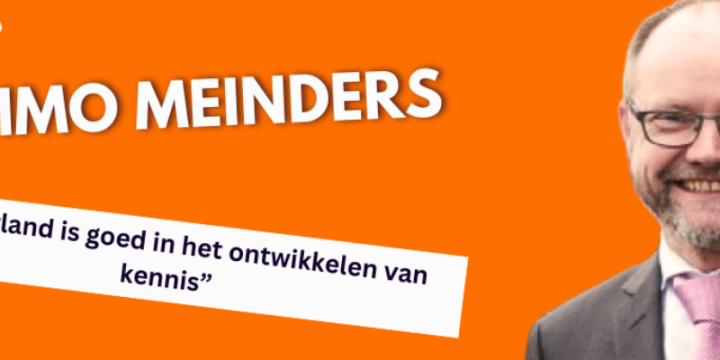Practice-oriented research at universities of applied sciences has made a lot of progress over the past twenty years. Now it is the turn of MBO education to profile itself in the research world. The fourth NWO debate 'Science works!' took place at the beginning of July at ROC Mondriaan in The Hague. This debate focused on the direction of research in MBO, HBO and WO and how these three can function optimally while retaining their own identity.
The NWO debate looked back on investments in education and research and looked ahead to the role of research in the future. Those in attendance included NWO chairman Marcel Levi, Sjoukje Heimovaara (chairman of the board of Wageningen University and Research), Adnan Tekin (chairman of the MBO Council) and Anneloes van Staa (lecturer Transitions in Care at Kenniscentrum Zorginnovatie). Minister of Education, Culture and Science Robbert Dijkgraaf was also present. MBO in the research world and the equal appreciation and connections between MBO, HBO and WO were important topics. The aim was to promote quality and diversity in research and to better align it with societal challenges. This was the central theme of the discussion.
Watch the debate:
Appreciate different talents
This cooperation between different forms of education and research can yield a lot, Adnan Tekin kicks off. 'I recently spoke to a colleague from Eindhoven University of Technology, where Lightyear, the first commercial solar car, was born. There is now quite a challenge surrounding that car, but the university students who invented it were not waiting to get started with MBO students. When they did, an MBO student immediately noticed that the wheel was welded incorrectly. “If you're going to drive this car, you won't get very far,” the student remarked. And he was right about that.”
The other participants also see added value in a broader spectrum of possibilities in research. Sjoukje Heimovaara sees it as a positive development that the 'drift' towards university that she still saw a few years ago is diminishing: 'People still sometimes think in terms of a ladder, while the various forms of education and research standing next to each other. The great thing about the idea of a range is that we look much more on the basis of equality which researcher and which research fits where." This already starts in early education, according to Heimovaara: "It is now the case that if you score high marks cognitively, you get to the top of the rankings. If you were to give more practical education, there would be more appreciation for different talents.'
Pioneering in college
AnneLoes van Staa already saw twenty-five years ago that her academic research would also fit in well at the university of applied sciences. She was still a pioneer when she transferred from Erasmus University to Rotterdam University of Applied Sciences. "It was seen as a demotion. People felt sorry for me that I couldn't stay at university and had to "go down" to college. But it was my own choice and I am very glad I made it. It has given my career a great flight and brought me a lot.' It was not easy to pioneer with research in an environment where it did not yet exist, Van Staa emphasizes. 'There was even a certain aversion from colleagues, 'academisation' was a dirty word. But I found it challenging.”
Practice-oriented research at universities of applied sciences now has a fully-fledged place in the research system. Yet there are still many steps to be taken, Marcel Levi sees: 'I am fascinated by the chain of research, in which each type of research is distinctive and adds something. But we also have to realize that the development is still in its infancy. The practice-oriented research simply has to get better in the coming years.'
We shouldn't play college or university
When it comes to practice-oriented research, MBOs have recently also started knocking at the door. ‘You have to sit down at the table if you want to be treated equally,’ says Adnan Tekin. He is pleased that the minister has given MBO this place at the table. ‘We are now going to see what our knowledge infrastructure should look like in five or six years. The extra resources will give us the time to think about this carefully in the coming years.” There is still a long way to go to achieve the same position as the universities of applied sciences, Tekin sees: “The Rotterdam University of Applied Sciences alone has eighty professors, we, as all MBOs together, currently have about a hundred practitioners (a researcher at an MBO institution, ed.) all over the country.” But, Van Staa counters, “That's how I started”. Yet for Tekin it is not the amount of resources or people that is paramount, but proving the added value of MBO. 'We shouldn't play college or university, as far as I'm concerned, but stick to our own job role.'
Minister Dijkgraaf also thinks it is important to emphasize the qualities in each of the domains: 'I think that the principle of equality means that you have the ideal starting position for that diversity. I recently got my hands on such a beautiful flexa color fan, as an illustration of this. You don't want to throw all that paint in one big pot, because then you end up with a gray-brown mess that no one can identify with. But at the universities of applied sciences and especially at the MBO there are many more possibilities to define the individuality.'
Misunderstanding
Towards the end of the conversation, the question is raised whether the focus on applied research is not at the expense of fundamental research. Marcel Levi is resolute about this: “I think that is such a misunderstanding. In recent years, of course, a great deal of applied research has been added, including at NWO. But that has been at the expense of fundamental research zero times. That is just as big, or even a bit bigger than it was. Even if you apply all inflation corrections and other things to it.' When asked about his wishes for the future, Levi indicates that it is now up to us to continue to find and improve the connection between all forms of research. 'That applies to the entire chain of research that we are now talking about, at all those different levels.'
Dijkgraaf indicates in his concluding remarks that 'we are gradually starting to realize that science plays and could play an even more important role in society than it does now. I think that's a very important message to hear from society and we're going to respond to that.'





